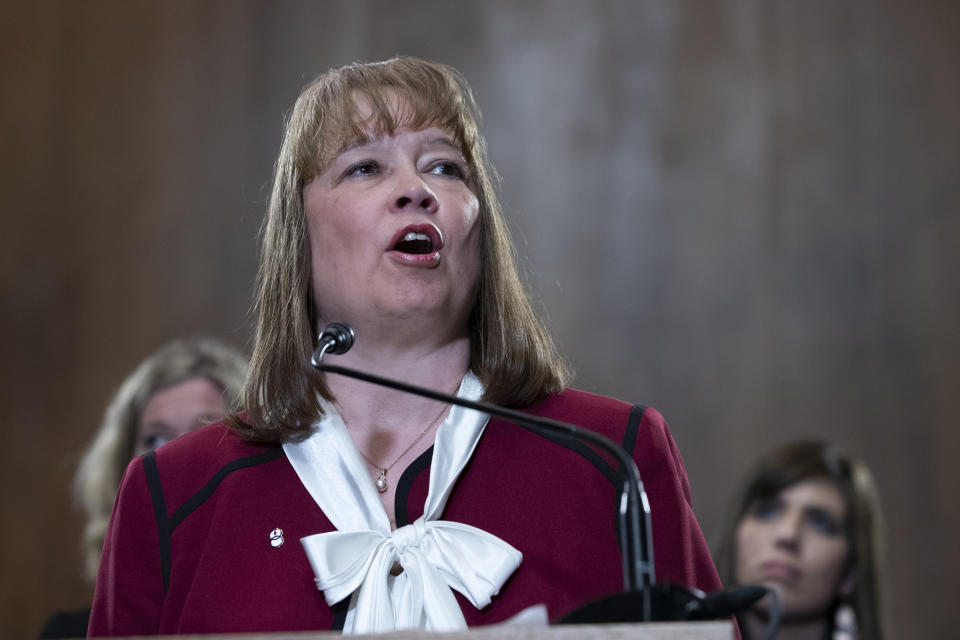Anti-abortion groups that worked to overturn Roe have no unified strategy to help women and children
- Oops!Something went wrong.Please try again later.
After working for decades to overturn Roe v. Wade and finally reaching success, the anti-abortion movement appears to lack a unified vision for how best to support women and children affected by the Supreme Court decision.
While Republican lawmakers have introduced a series of bills aimed at providing federal support, some anti-abortion groups say much of that work can be done through crisis pregnancy centers, churches and state policies promoting families, which they argue could eliminate the need for abortions altogether.
But research suggests some of those plans are unlikely to provide an effective safety net for low-income women and children, and it’s unclear how much support will materialize for any proposed federal legislation given Republican leaders’ opposition to funding federal paid leave, extending child tax credits and expanding maternal health care.
Many anti-abortion lawmakers promised to support women and children after state abortion bans were imposed after the Supreme Court struck down Roe last month in Dobbs v. Jackson Women’s Health Organization. Federal bills were introduced last week by several Republican lawmakers, including Sens. Mitt Romney of Utah, Marco Rubio of Florida and Kevin Cramer of North Dakota.
Romney’s plan, co-sponsored with Republican Sens. Richard Burr of North Carolina and Steve Daines of Montana, called the Family Security Act 2.0, would reinstate the child tax credit for working couples and make it available during pregnancy through a cut to the earned income tax credit.
Rubio’s plan, introduced in the House by Republican Rep. Nancy Mace of South Carolina, called the Standing with Moms Act, would create a federal website that would list government and private resources focused on mental health, pregnancy counseling and alternatives to abortion. It would be part of Rubio’s larger Providing for Life Act that would allow parents to use their Social Security benefits to pay for parental leave and claim the child tax credit for “unborn children,” among other measures.
Cramer’s Unborn Child Support Act, supported by Rep. Mike Johnson, R-La., in the House, would allow pregnant women to collect child support.
Research suggests a need for strengthened support systems for parents and children in states with abortion bans, but how to provide it remains up for debate within the anti-abortion movement, particularly among those groups that fought so long to overturn the constitutional right to an abortion.
Women who can’t obtain abortions are almost four times more likely to end up living below the federal poverty level than those who do get them, according to data from the Turnaway Study, a landmark five-year investigation by researchers at the University of California, San Francisco, that examined how being denied an abortion affected about 1,000 women and their children.
None of the 23 states that have already banned abortions or plan to do so offer paid family leave, and the 14 states with the tightest restrictions have the worst maternal and child health outcomes, according to the Commonwealth Fund, a private foundation that supports independent research on health care.
Many anti-abortion activists support funding crisis pregnancy centers, which they say provide ultrasounds, pregnancy tests, diapers, baby clothes, car seats and strollers. But the centers have also been accused of spreading medical misinformation in attempts to dissuade women from obtaining abortions, and anti-abortion groups are split over whether the centers should be funded federally or by states.
When two undercover NBC News producers who visited state-funded centers in Texas after Roe v. Wade was overturned to ask for pregnancy counseling, counselors falsely claimed that abortions cause mental illness and falsely implied they could also lead to cancer and infertility, according to the news investigation.
Carol Tobias, president of the National Right to Life Committee, a group that spent decades working to overturn Roe, wants crisis pregnancy centers to receive more government funding, which its state affiliates enthusiastically support, she said. Such funding is included in Rubio’s proposed Providing for Life Act, which Tobias' organization supports.
While some crisis pregnancy centers receive government funding, most are supported by private donations, according to the Charlotte Lozier Institute, the anti-abortion research and education arm of Susan B. Anthony Pro-Life America, which supports anti-abortion candidates for office.

“Tax dollars have been funding Planned Parenthood for years, so why not make some of that money also available to the pregnancy centers that are providing real help to women?” Tobias said in reference to Title X of the Public Health Services Act, which granted federal funding to Planned Parenthood in 1970.
With about 2,700 in the U.S., pregnancy centers outnumbered abortion clinics 3 to 1 before state bans took effect. In 2019, crisis pregnancy centers served 1.85 million people, the Lozier Institute said.
The majority of their staff are volunteers, and as of 2019, less than 40% of their paid staff and volunteers combined were licensed medical professionals, though some volunteers have been accused of wearing white coats to falsely suggest they are.
Many leading anti-abortion rights groups, including the U.S. Conference of Catholic Bishops, which mobilized members of the Roman Catholic Church against abortion, and Susan B. Anthony Pro-Life America, point to Mississippi’s recently enacted Pregnancy Resource Act as an example of model legislation other states should adopt to support crisis pregnancy centers. Tobias said her group would also support state funding of the centers.
The Mississippi law allocates $3.5 million in tax credits for individuals and businesses that donate to eligible centers. Missouri has a similar program that was reauthorized this year to offer more than $7 million in tax credits, which led to a spike in large donations, according to a ProPublica analysis.
Jameson Taylor, director of policy and legislative affairs at AFA Action, the government affairs affiliate of the American Family Association, said officials would evaluate the impact of the new tax credit at the end of the tax year. Taylor helped draft the Mississippi Pregnancy Resource Act and the state’s 15-week abortion ban that provided the basis for the Dobbs case.

He is working on forming the group’s first legislative agenda since Roe v. Wade was overturned and said he hopes to bring bills like the Pregnancy Resource Act to other states, along with “policies to strengthen families and marriages.” (The Southern Poverty Law Center has designated the AFA a hate group for its anti-LGBTQ views.)
Taylor said he does not support most of the recently introduced federal legislation, arguing they will “expand government dependency” and encourage fraud.
“I believe the family is the best department of welfare, education, health care that there is,” Taylor said, adding that 90% of women who seek abortions in Mississippi are unmarried and that he’s looking into legislative proposals that could mandate “cooling off periods” for couples considering divorce. Thirty-eight states mandate waits of anywhere from 10 days to a year between filing an initial petition and moving forward with divorce in court.
“This is something to look at long-term — how can we strengthen marriage in America?” Taylor said.
Diana Greene Foster, director of the Turnaway Study and a professor of obstetrics, gynecology and reproductive sciences at the University of California, San Francisco, cautioned against viewing marriage as a means of preventing abortion.
She pointed to data showing that women who both received and were denied abortions were equally likely to have split from their partners two years later, and that women who were denied abortions were at greater risk of staying in contact with violent partners.
“It doesn’t promote long-term family building to have a baby with someone you didn’t want to have a baby with,” Foster said.
Greg Schleppenbach, director of public policy for the U.S. Conference of Catholic Bishops, said that members support Rubio’s proposal to create a website with resources for pregnant women, and that they and other anti-abortion groups would explore ways to tackle what he called “the breakdown of the family.”
He said conference officials are actively promoting its Walking With Moms in Need initiative that gives parishes information about how members can dissuade women from seeking abortions and support pregnant mothers.
Representatives for other anti-abortion groups that worked to overturn Roe did not respond to requests for comment about how they planned to support women and children, including the Republican Attorneys General Association, which has worked to elect anti-abortion attorneys general; the Republican National Coalition for Life, which was founded by the conservative activist Phyllis Schlafly in 1990; and March for Life, which has sponsored annual anti-abortion rallies in Washington since 1974.
The Southern Baptist Convention and the Family Research Council, both of which have long campaigned against Roe v. Wade, said in statements that they back legislation to support mothers and children but declined to provide more details. (The Family Research Council is also designated as a hate group by the SPLC for its anti-LGBTQ views.)
O. Carter Snead, a law professor at the University of Notre Dame, said this moment is an opportunity for the anti-abortion movement “to try to think carefully about how can we be helpful to families in need more broadly. It’s a systemwide set of concerns and effects that need to be addressed here.”
Foster, the Turnaway Study director, said that “it is particularly important post-Roe … to make sure that the result of this isn’t just widespread child poverty for people who wanted an abortion.”
But, she added, “it’s not like we’re just ready for all those babies [who will be born] and we’re going to provide the health care, the income support, the food, the housing that those people need. We already don’t do that.”

